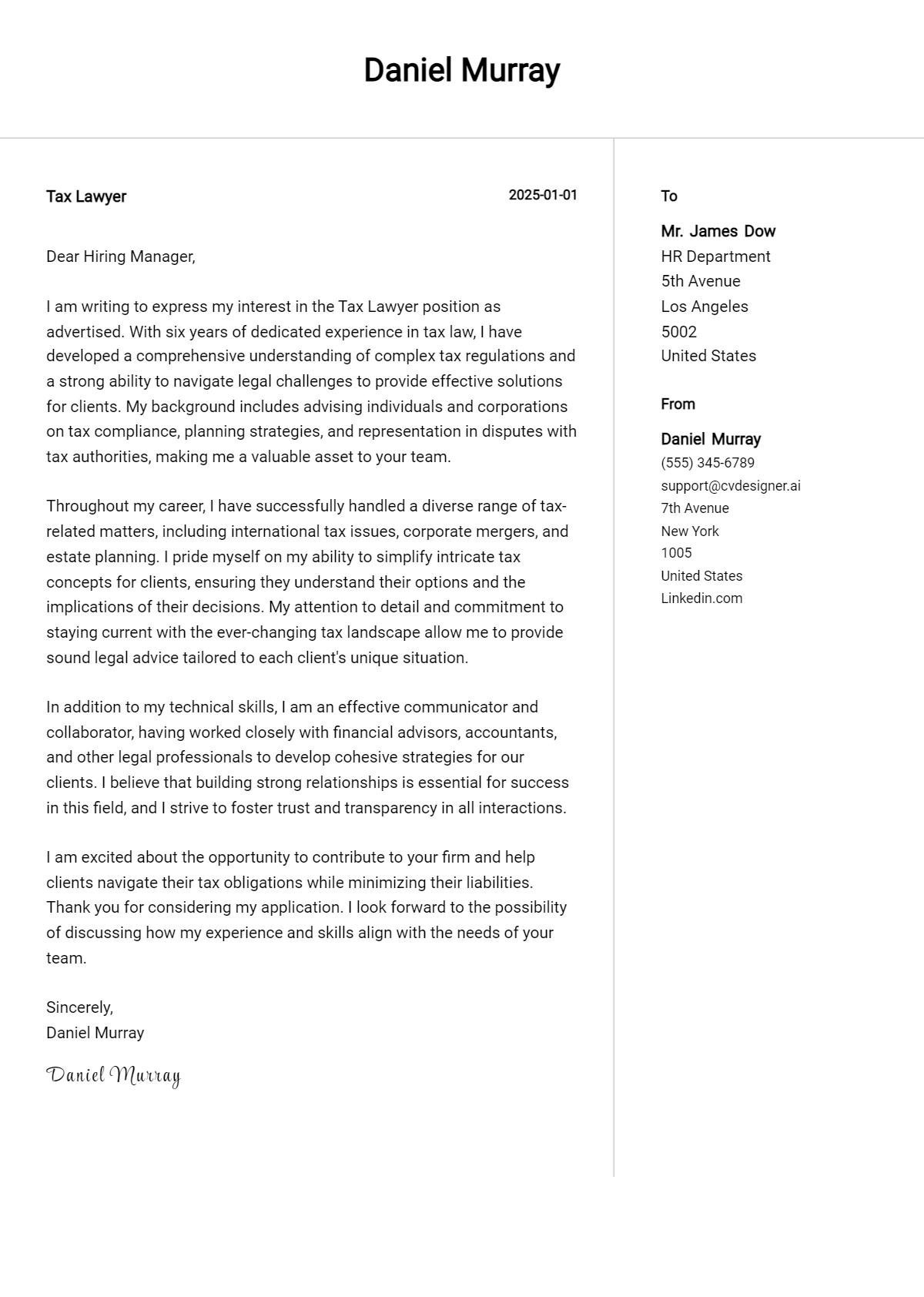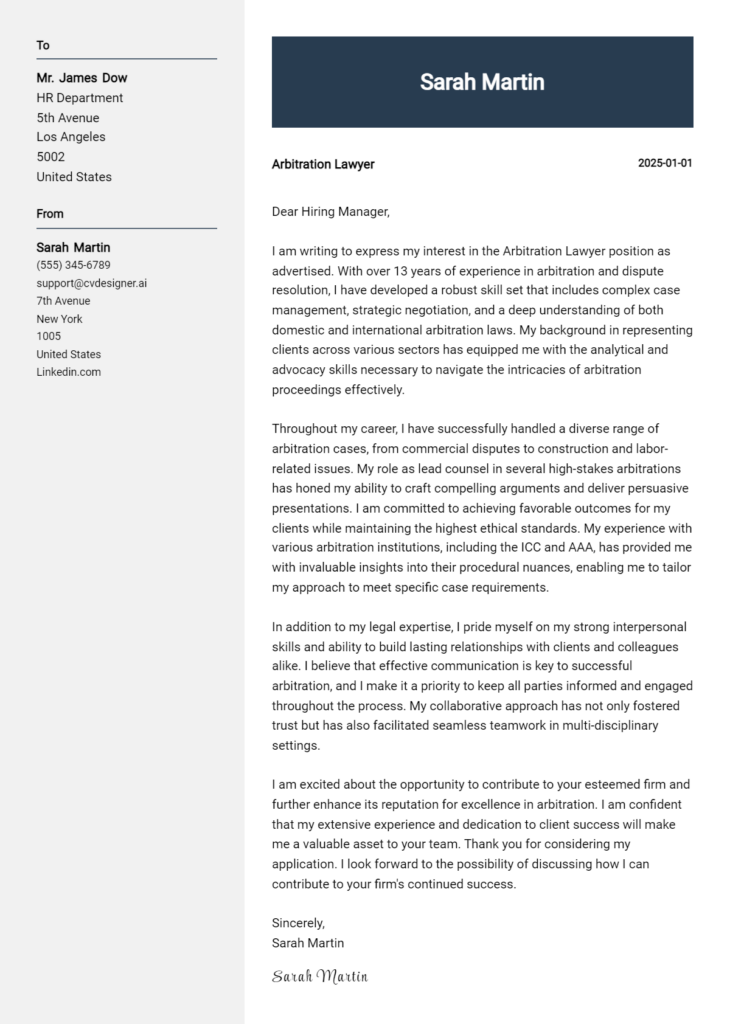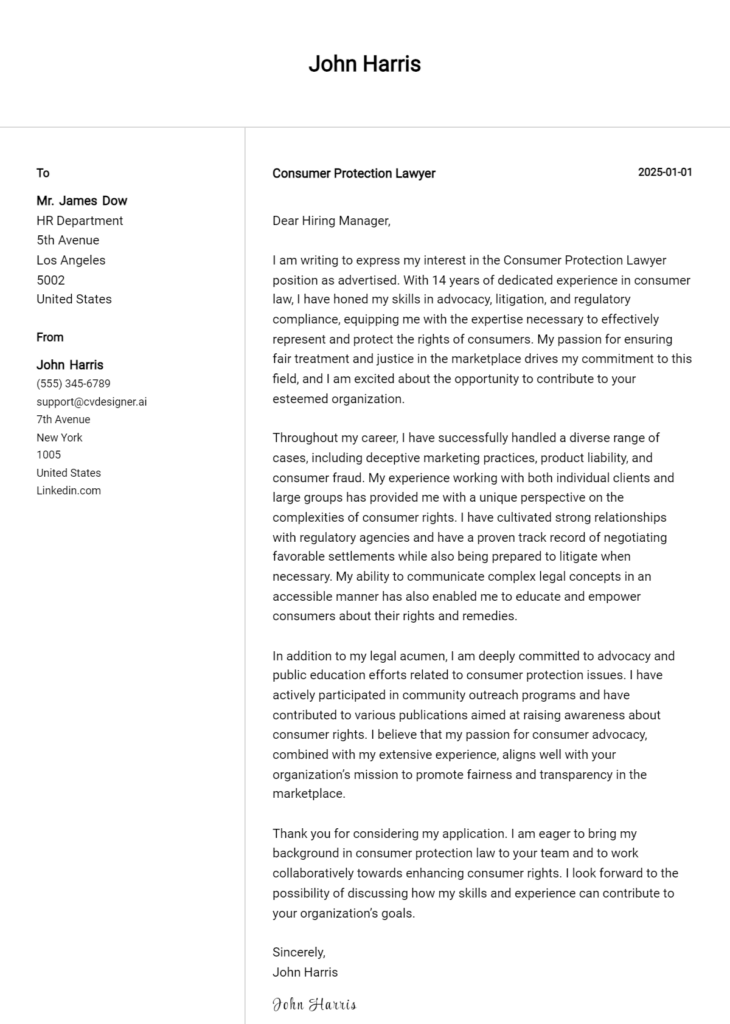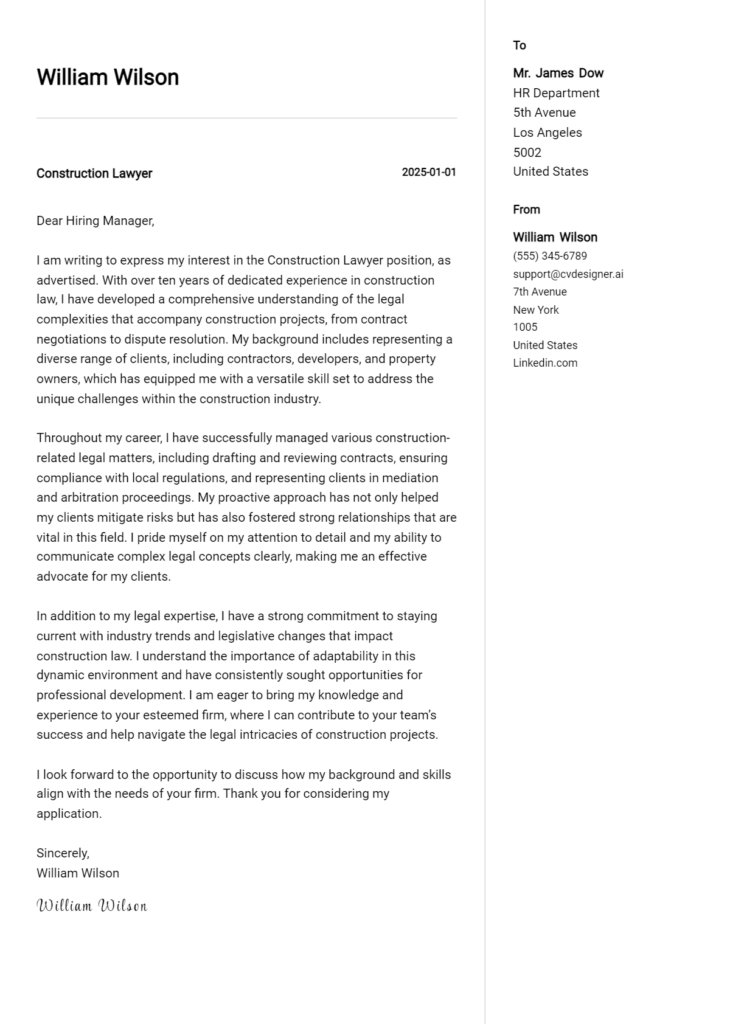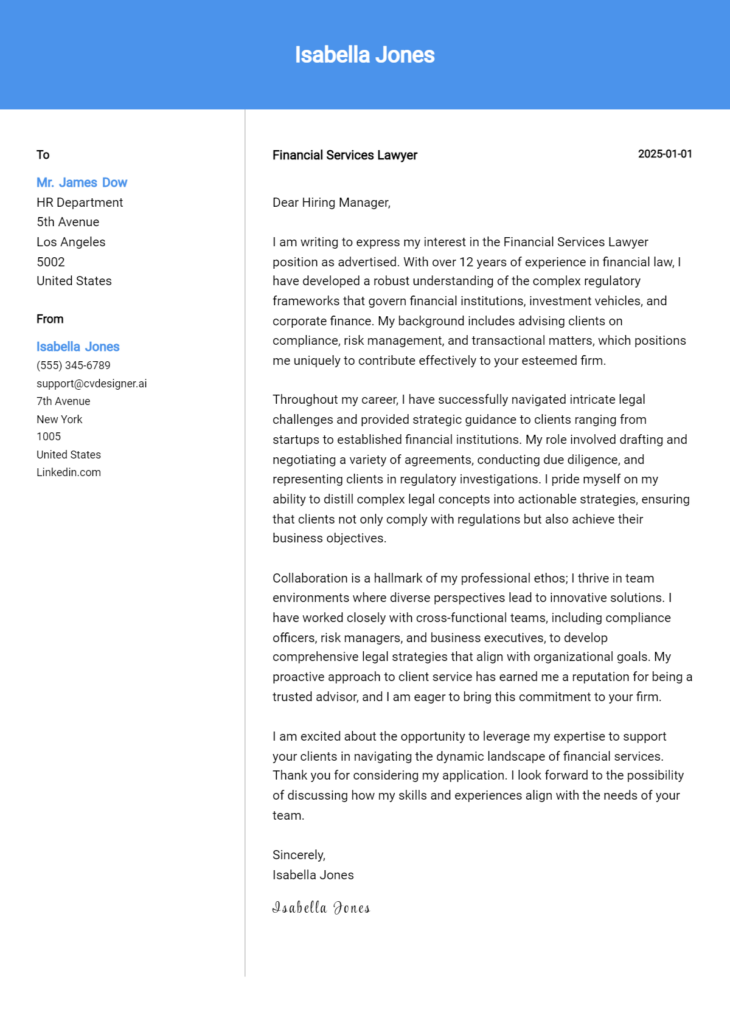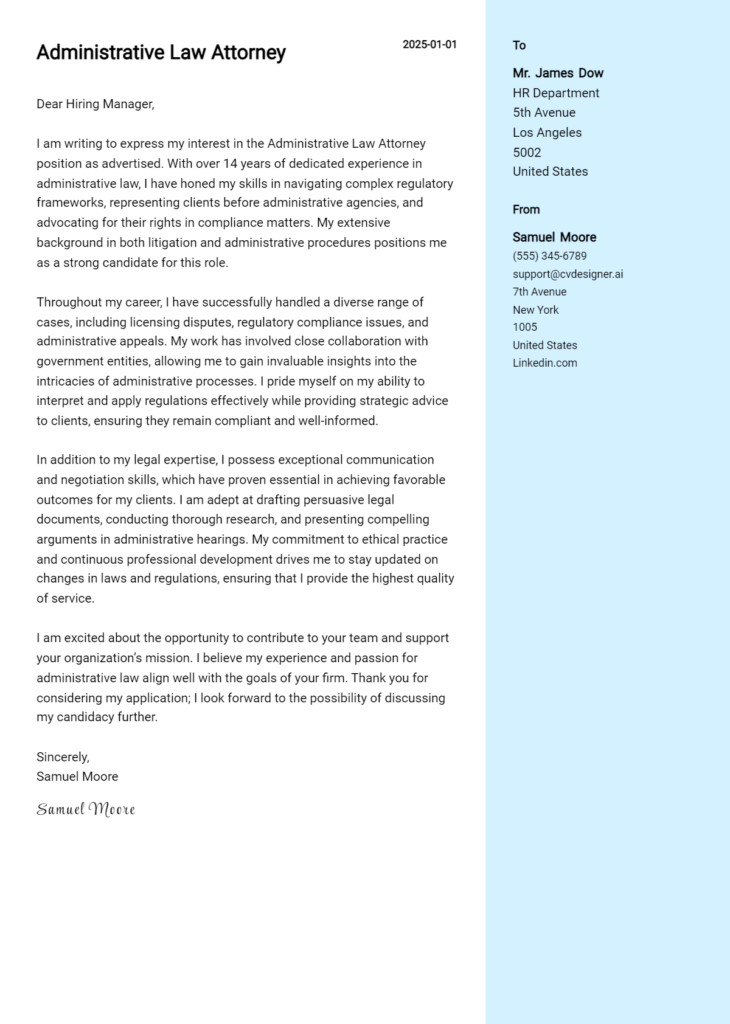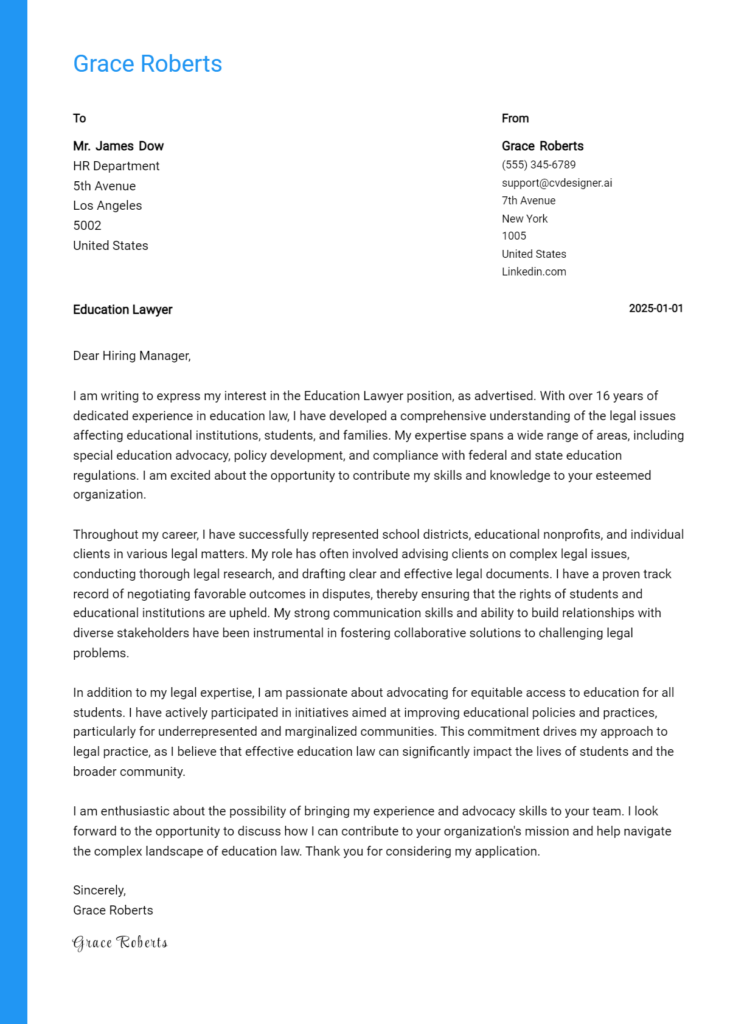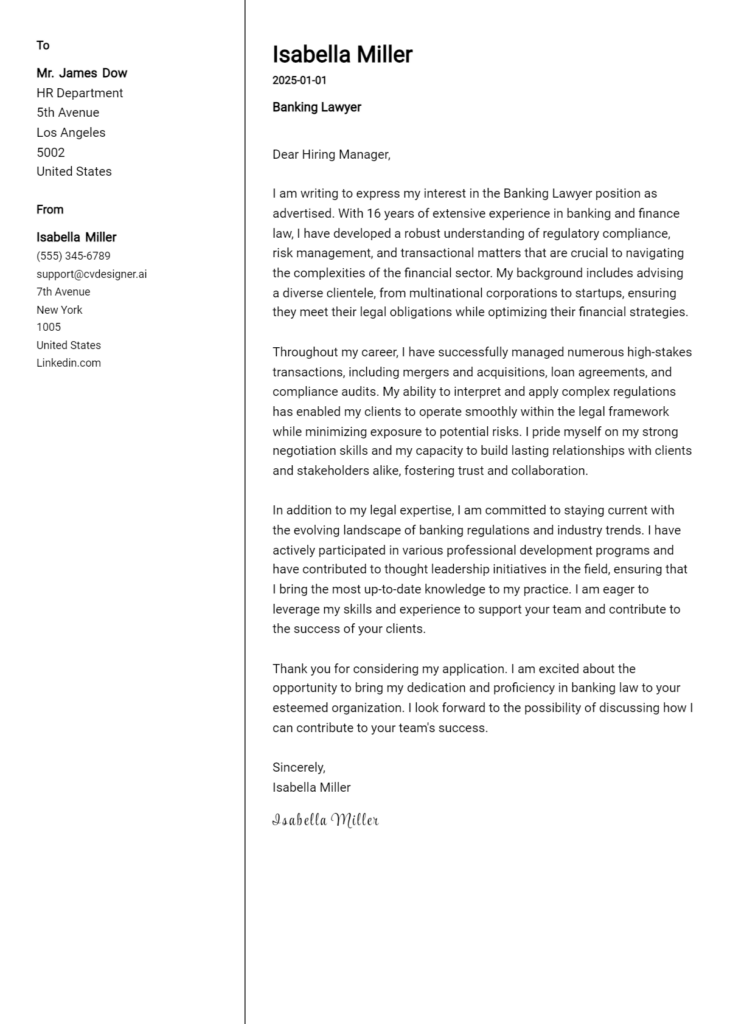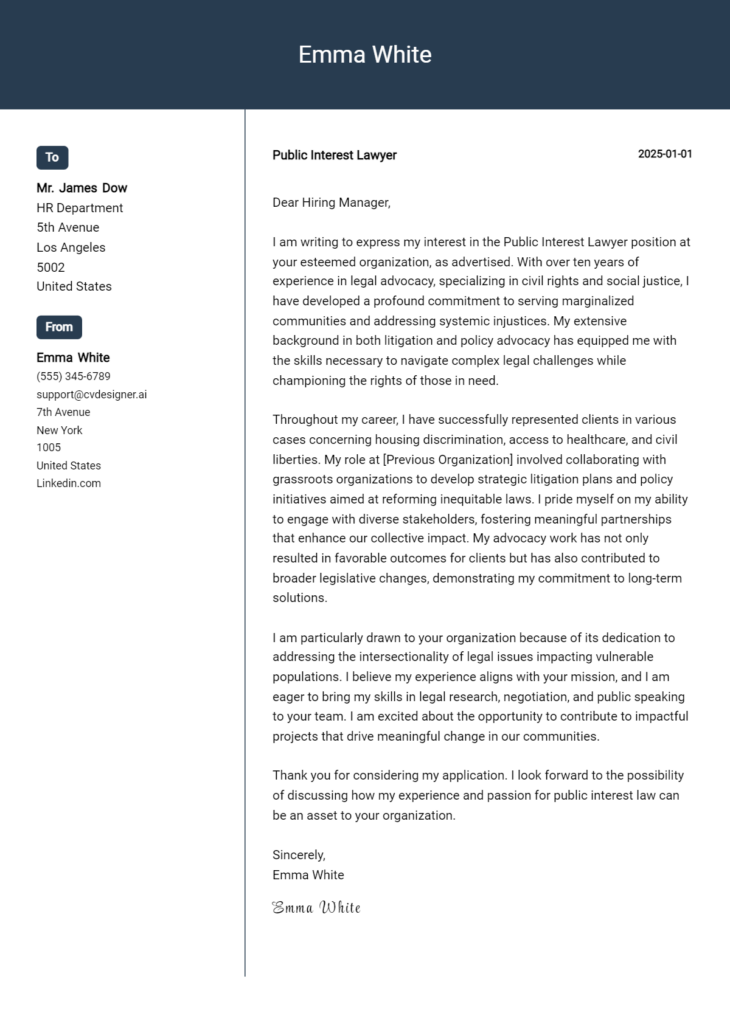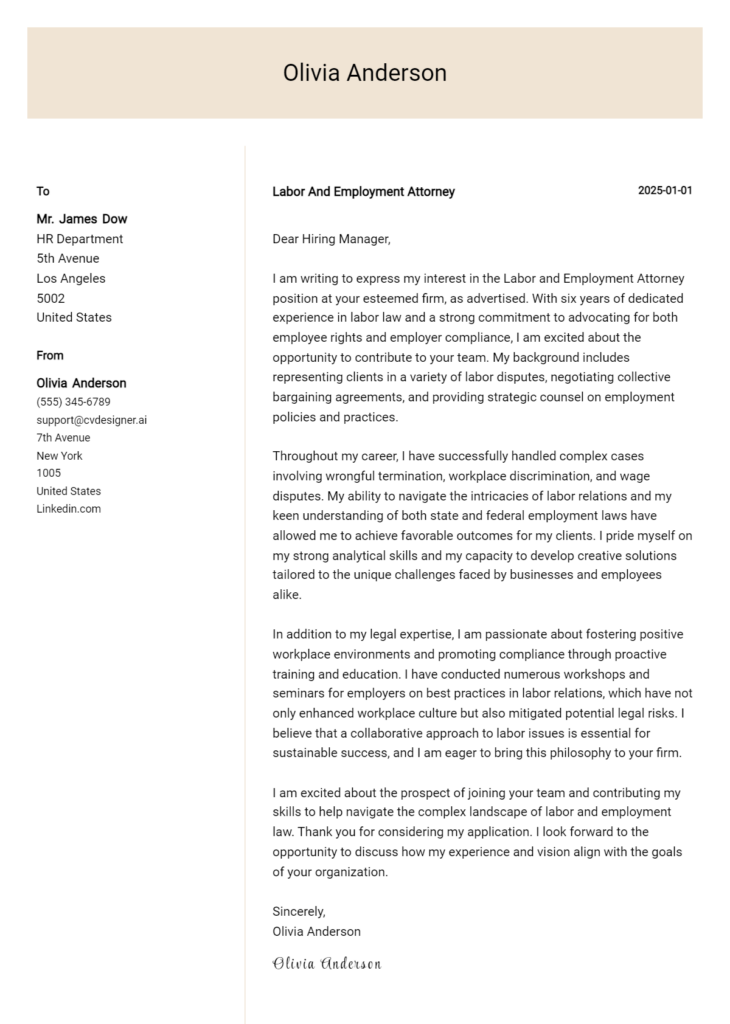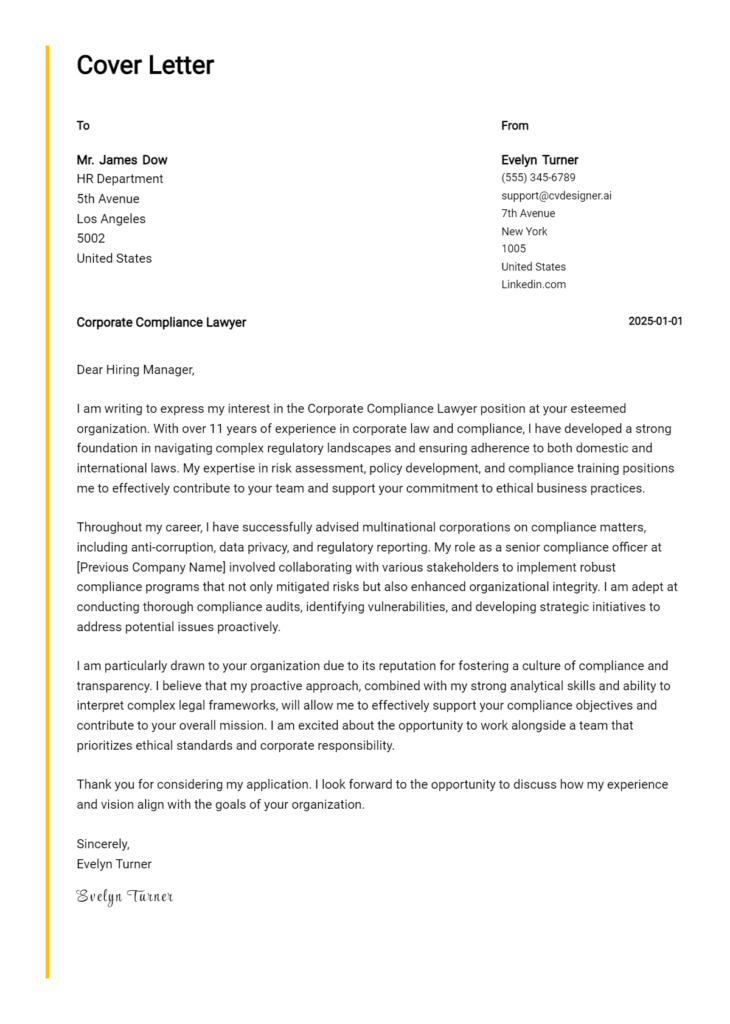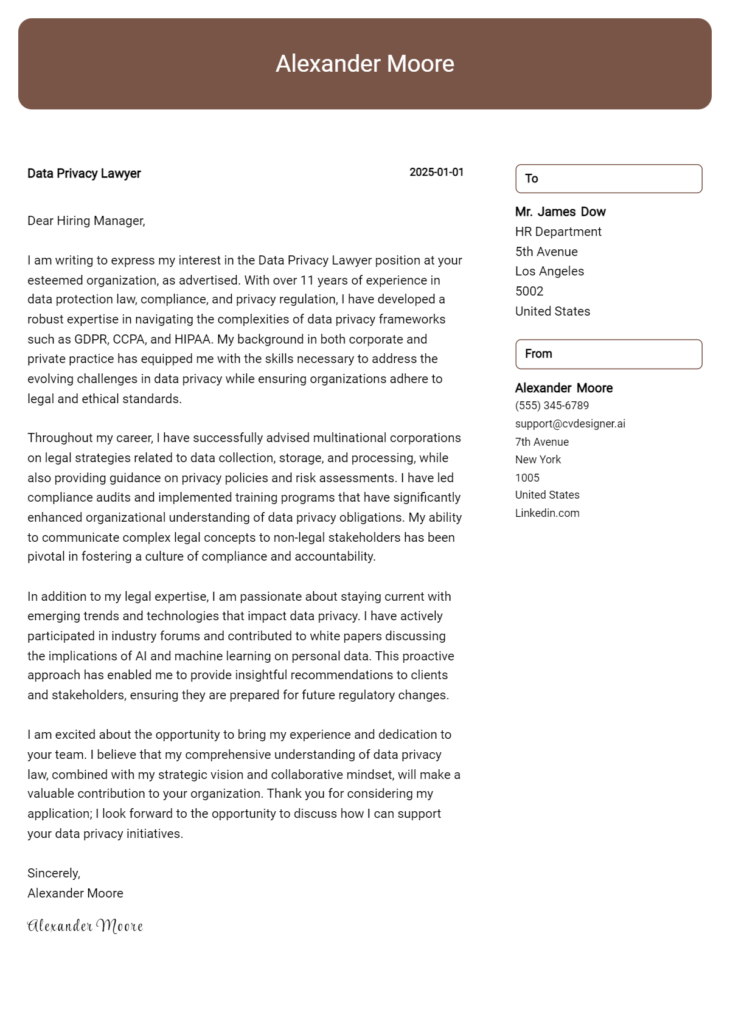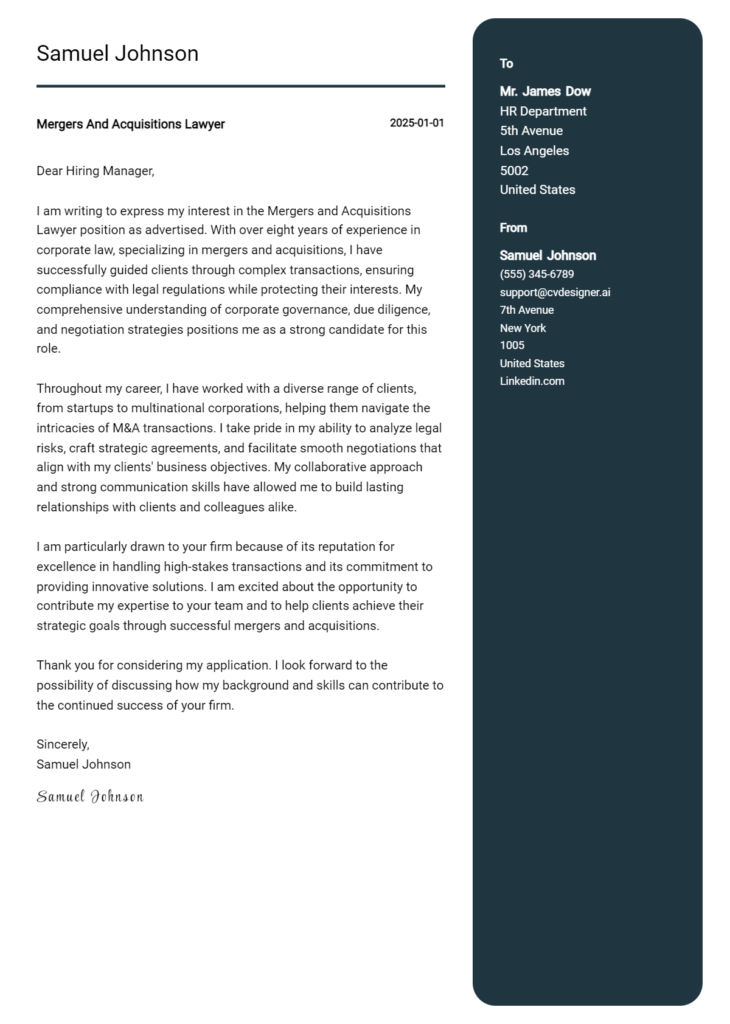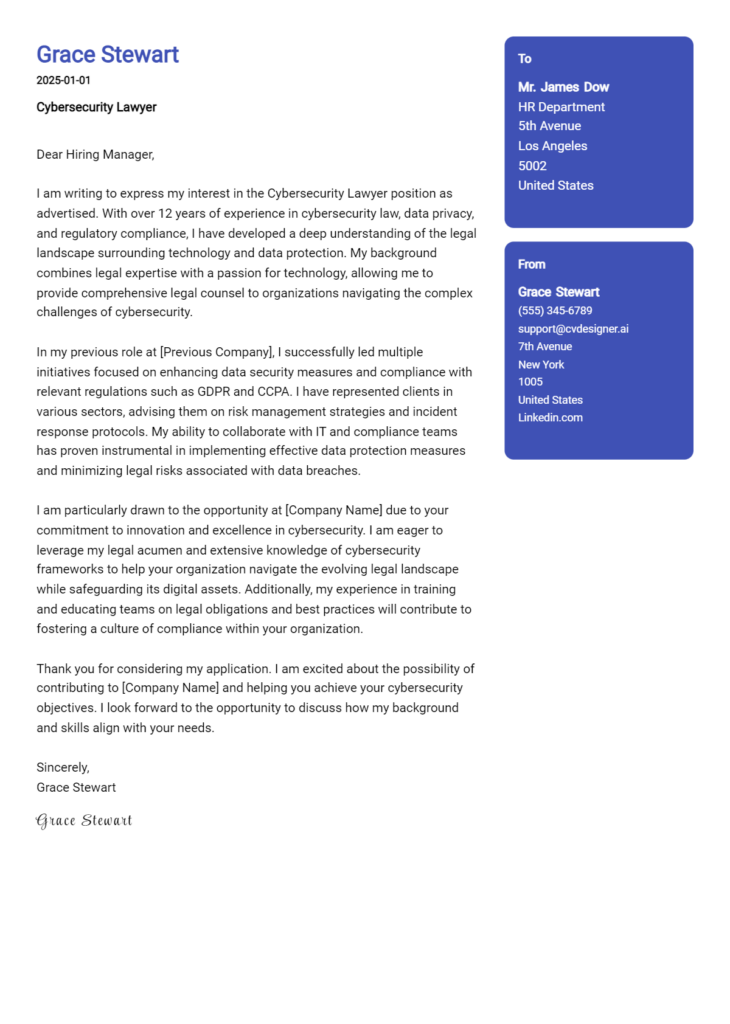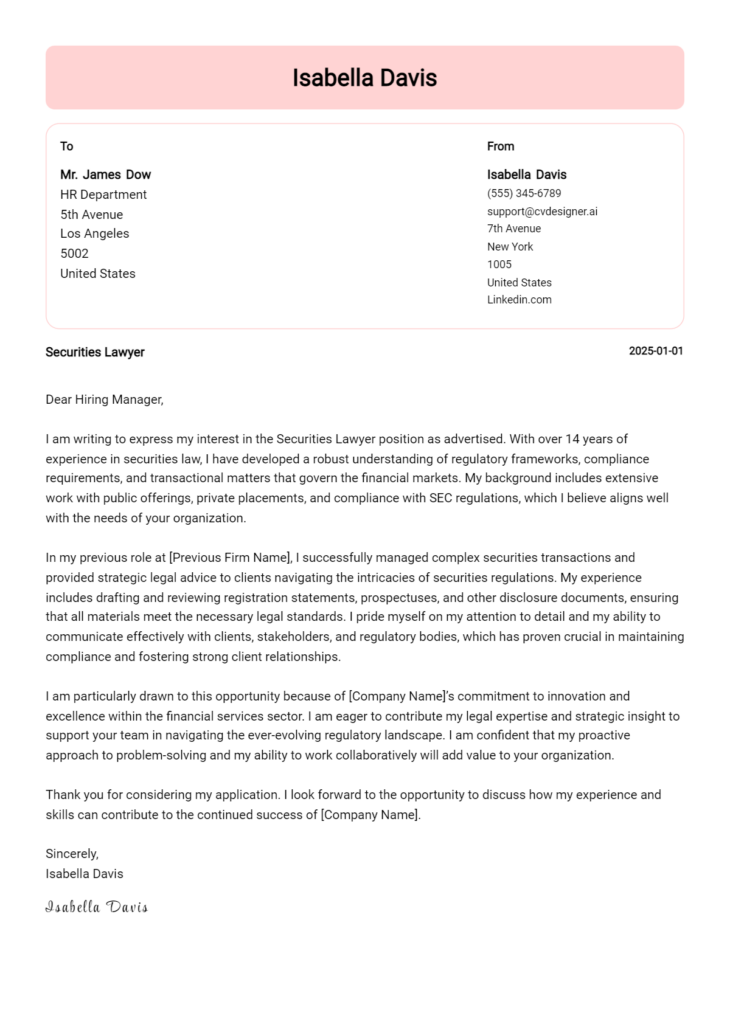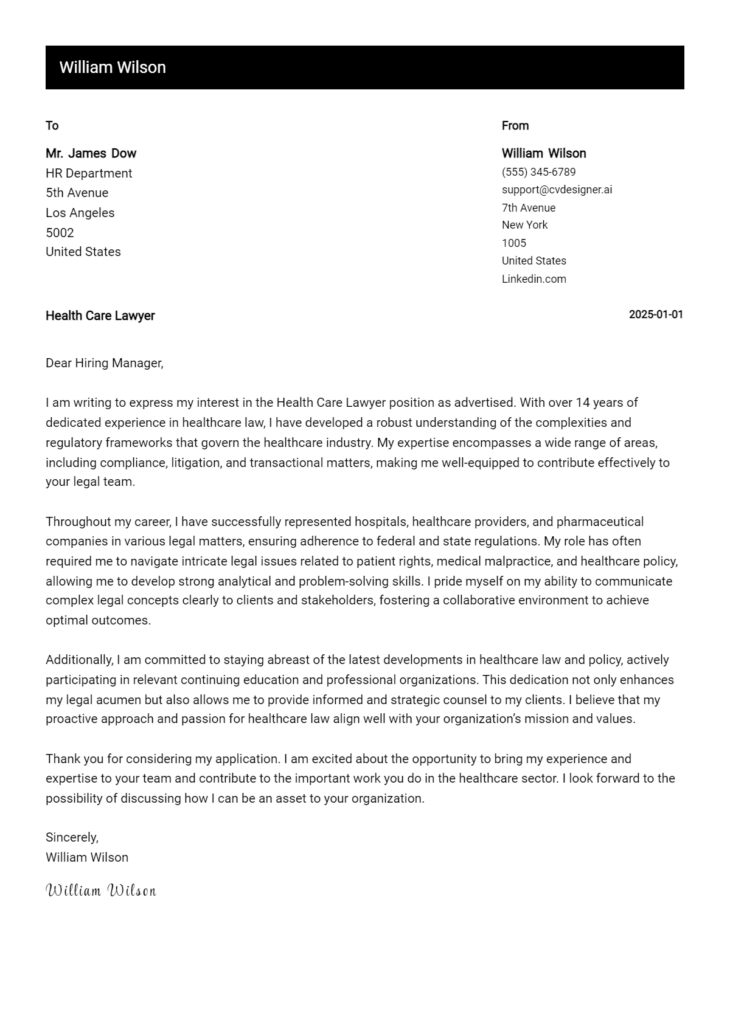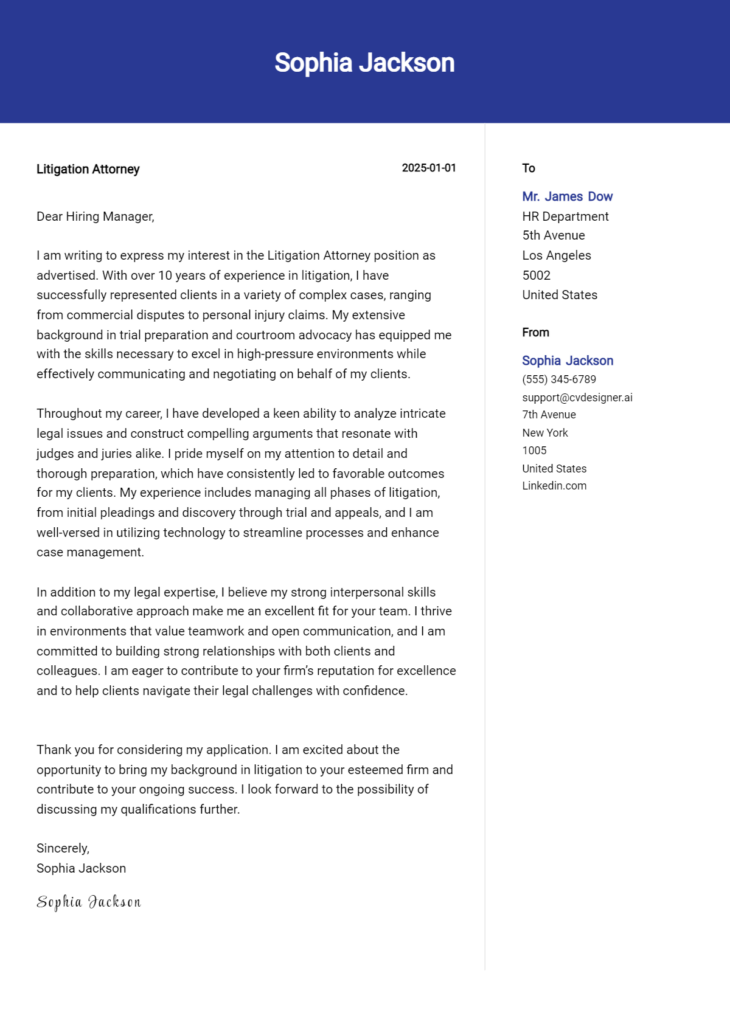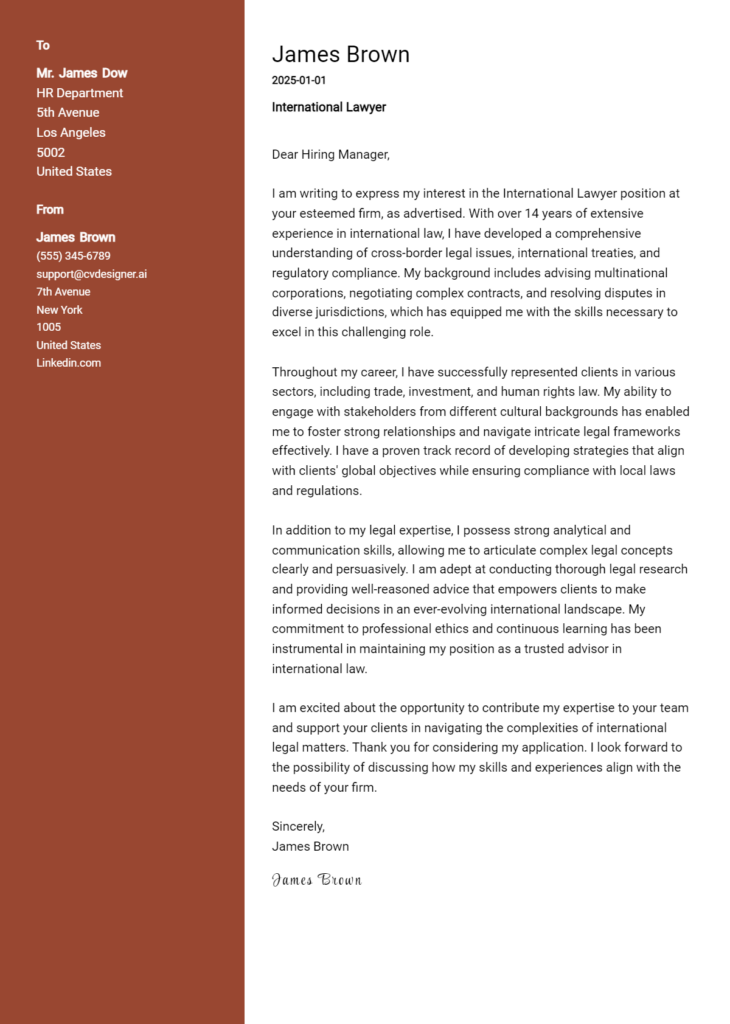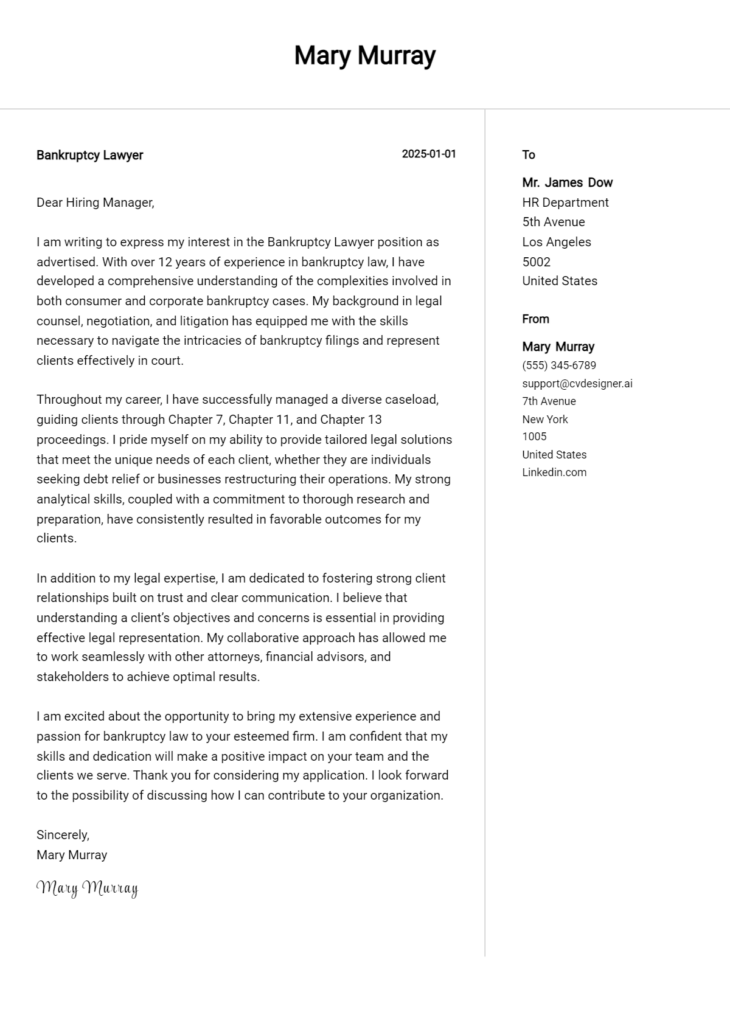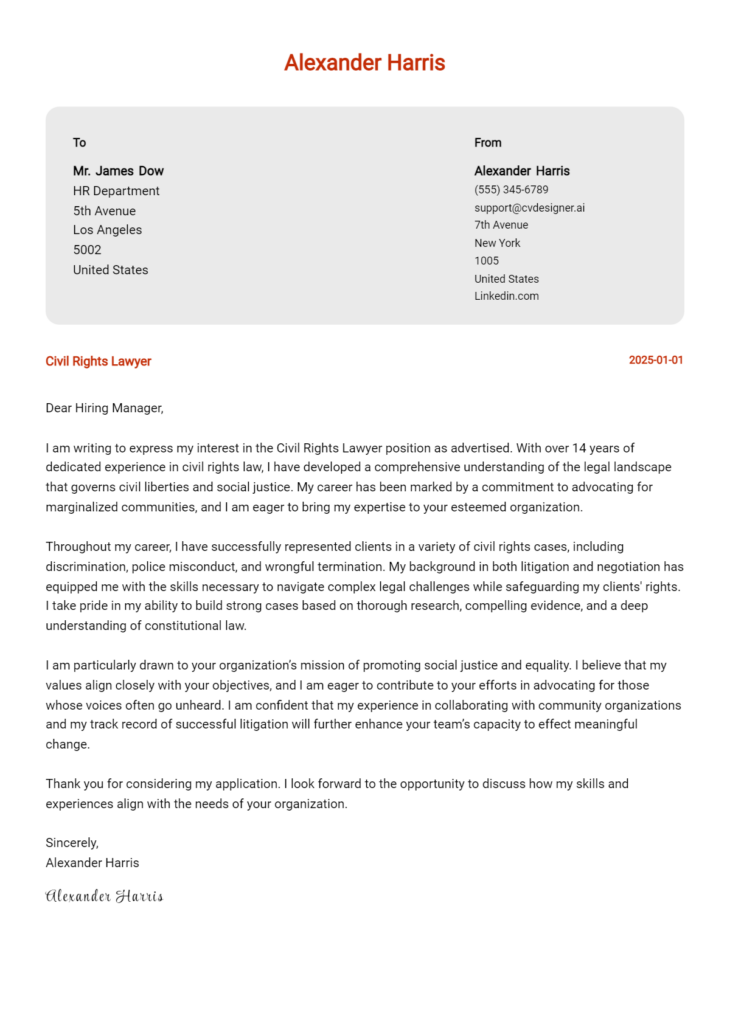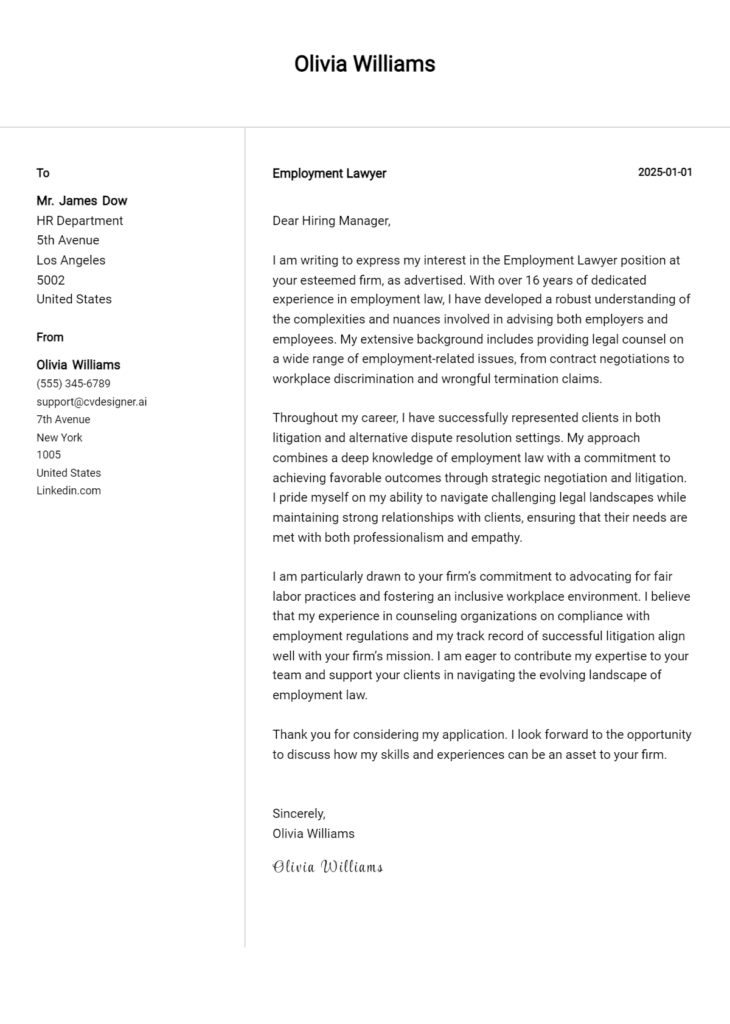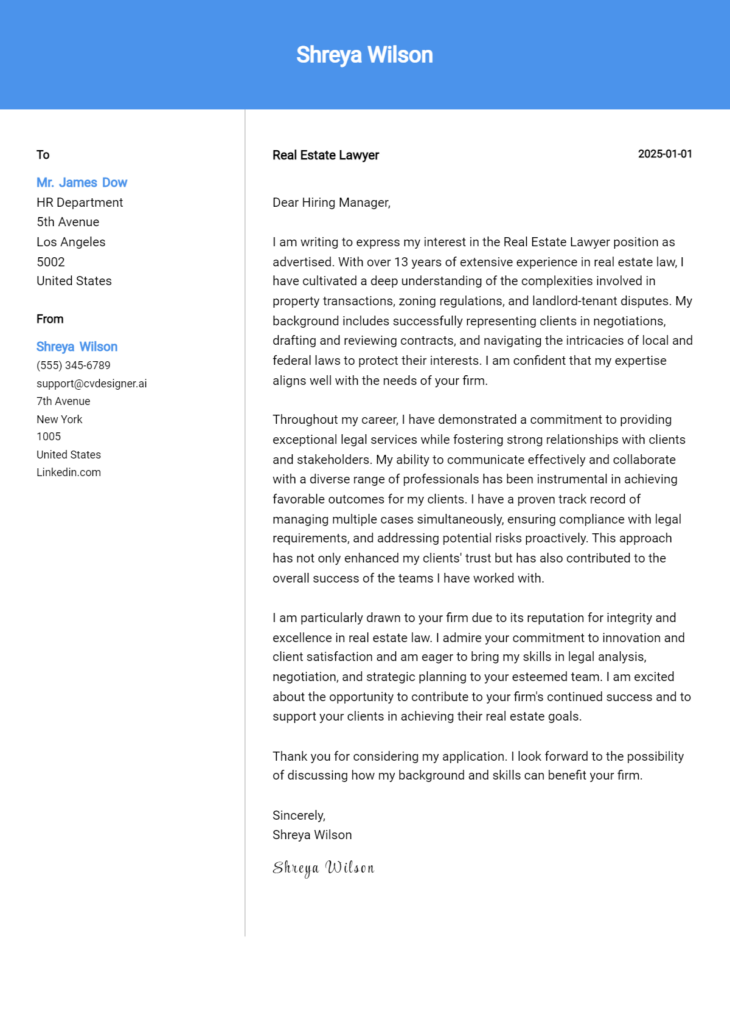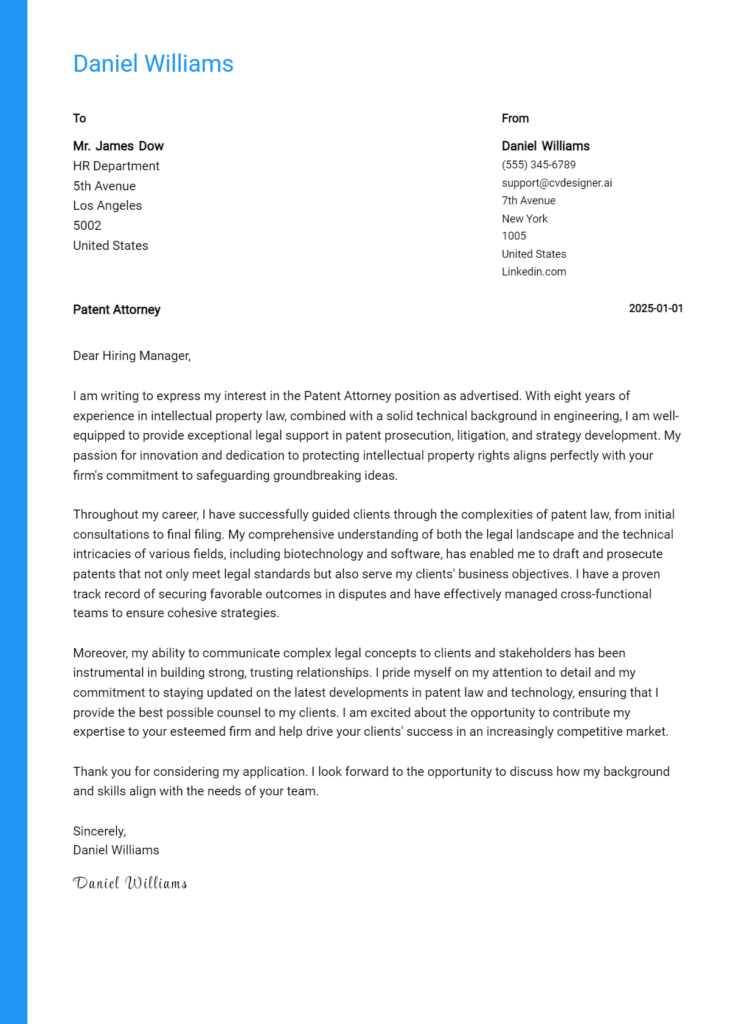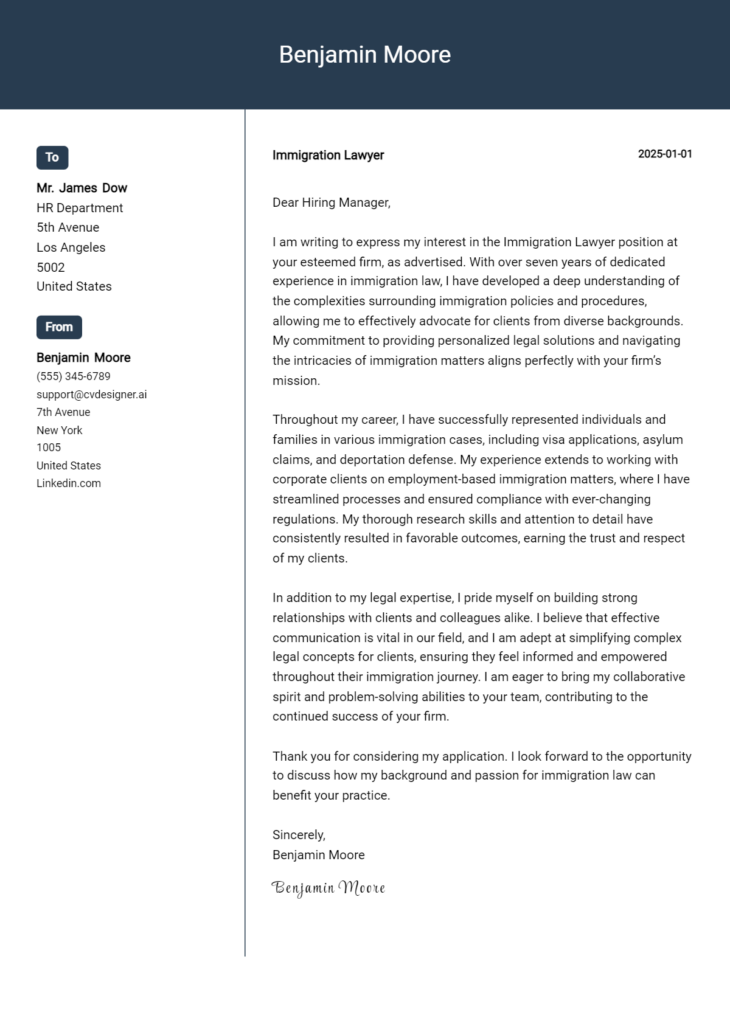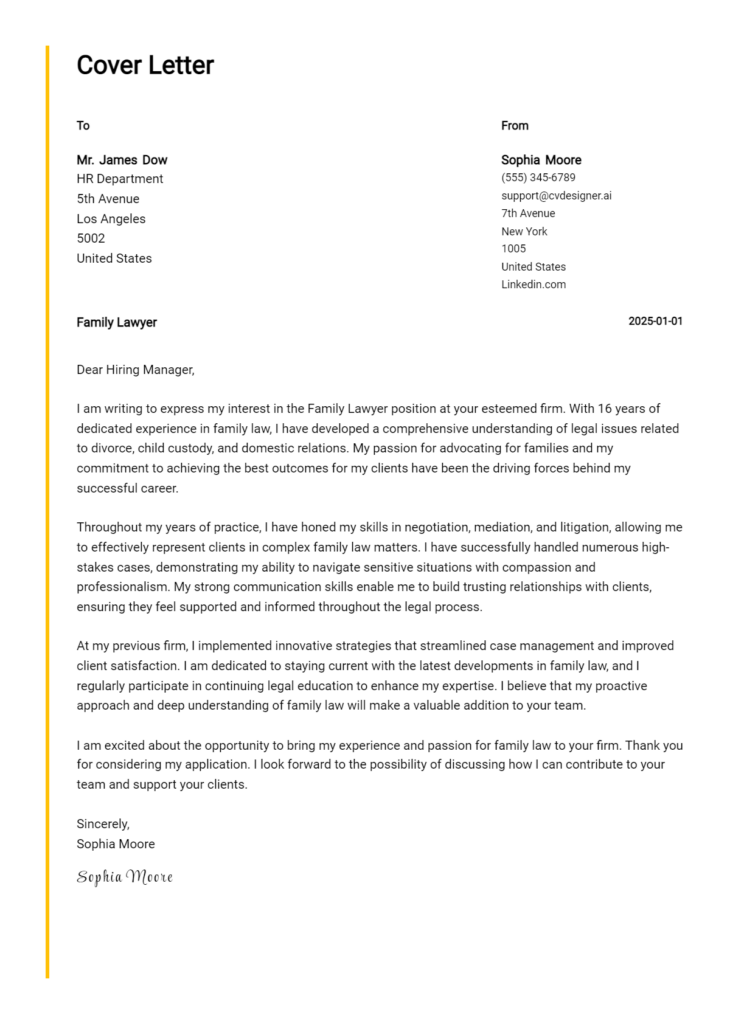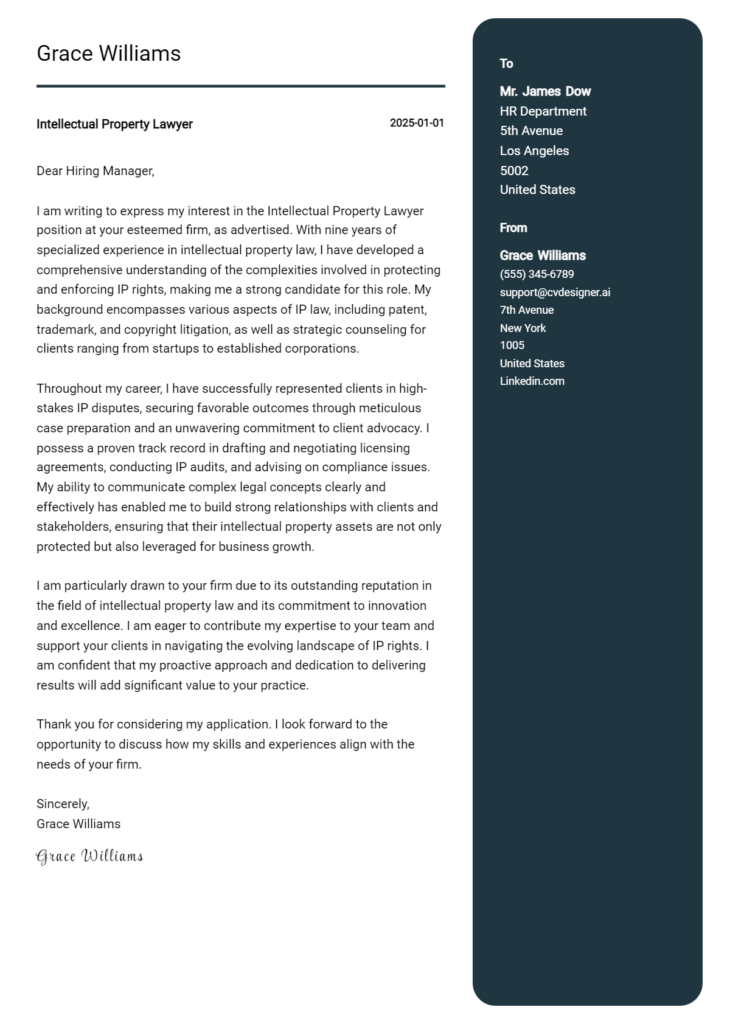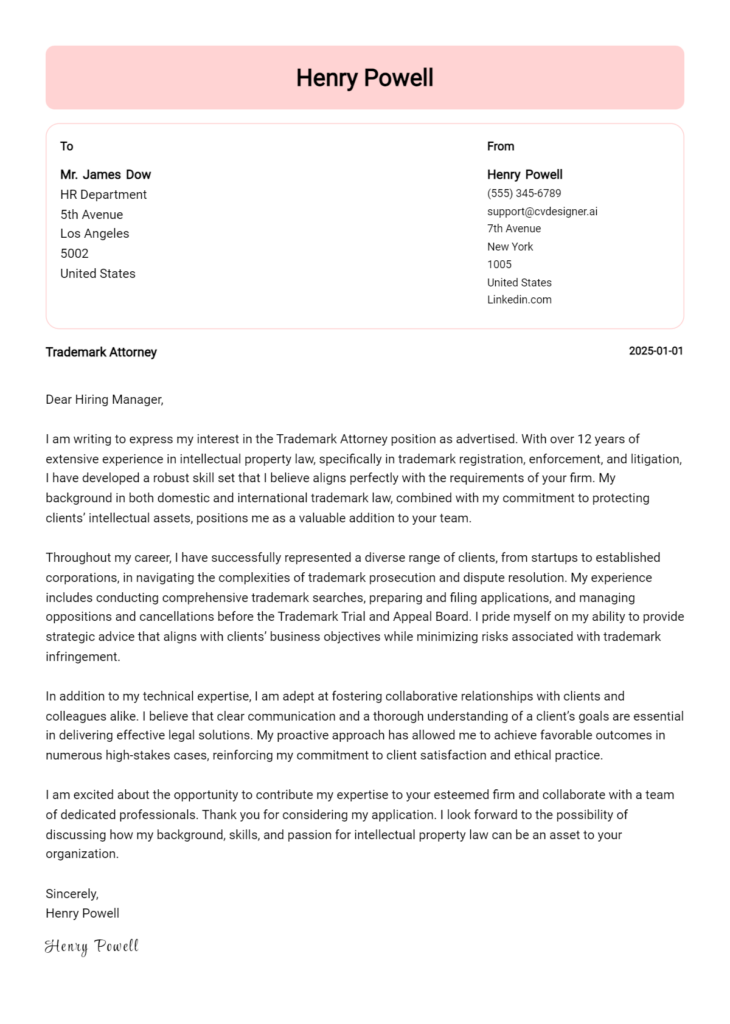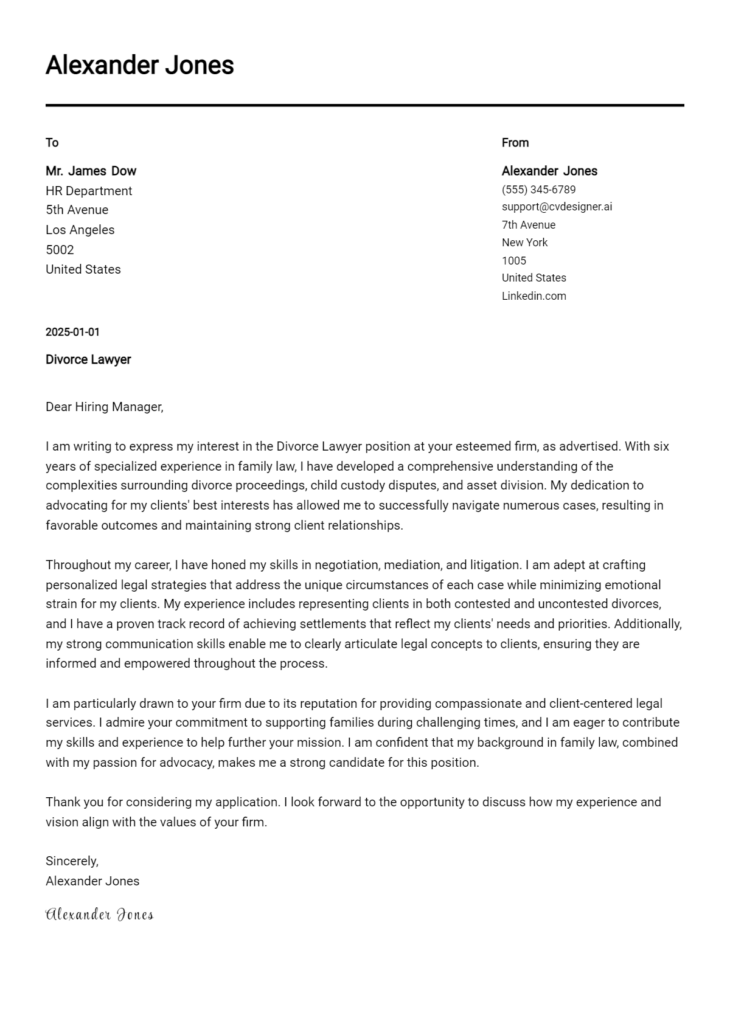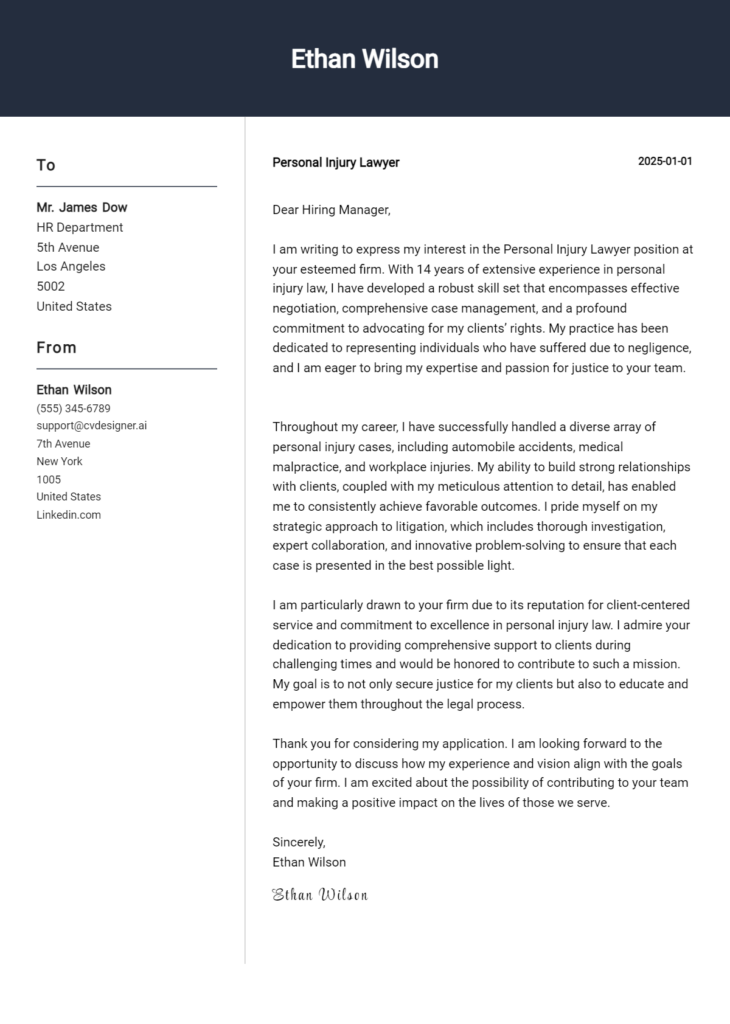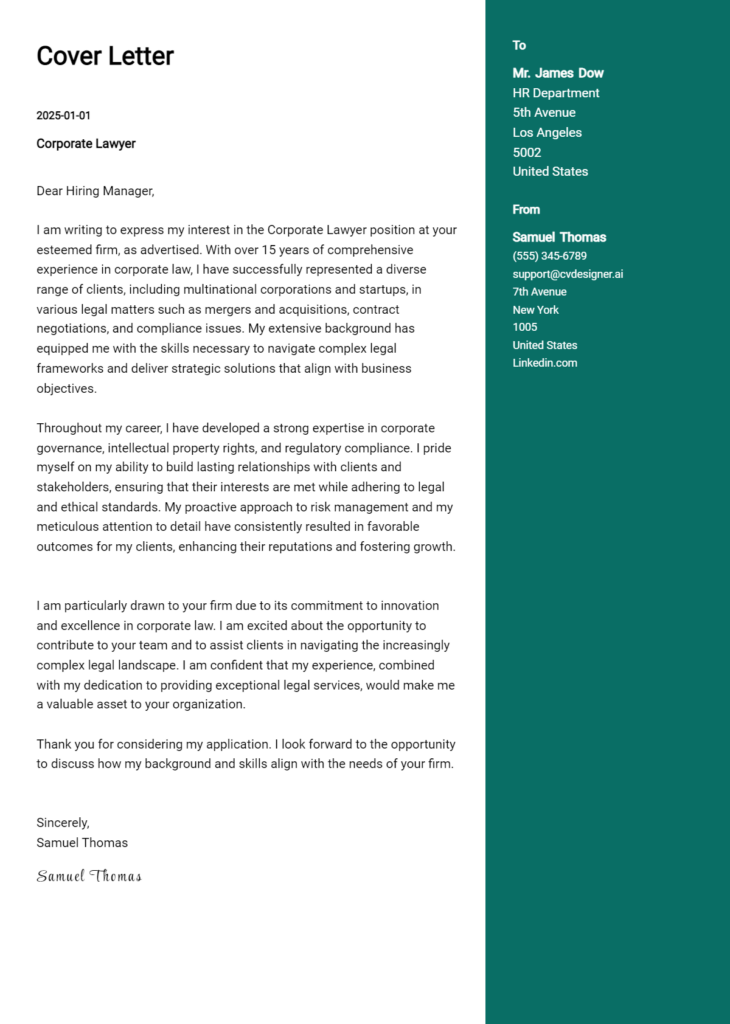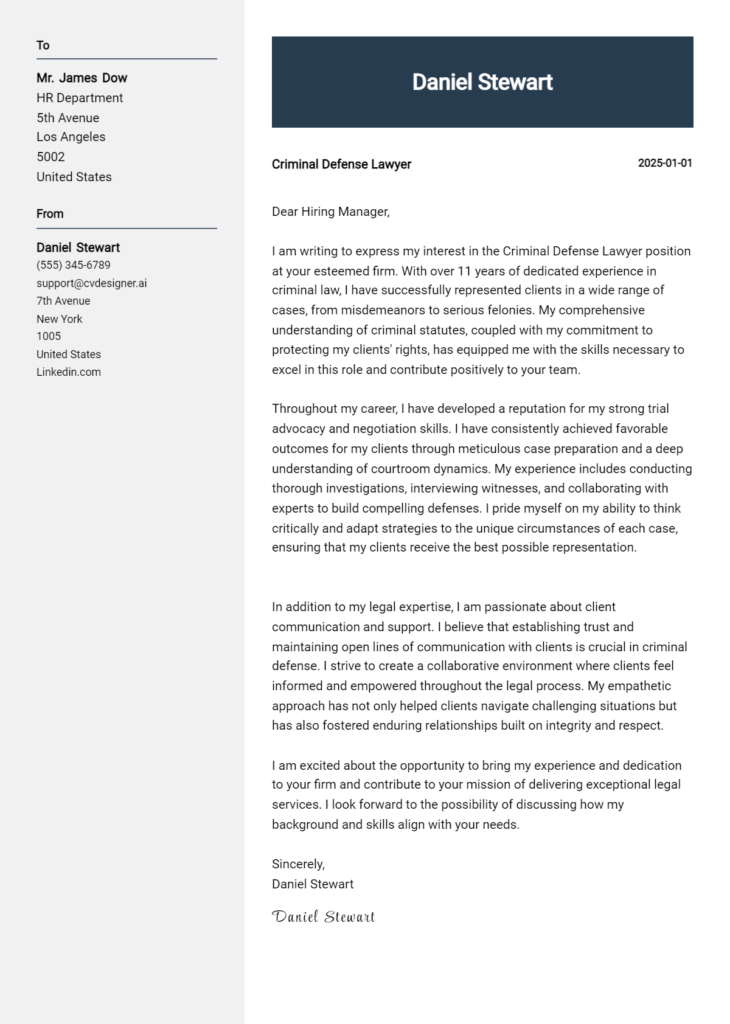Tax Lawyer Cover Letter Examples
Explore additional Tax Lawyer cover letter samples and guides and see what works for your level of experience or role.
How to Format a Tax Lawyer Cover Letter?
Crafting a compelling cover letter is crucial for a Tax Lawyer, as it serves as your first impression in a competitive field. The way you format your cover letter not only conveys your qualifications but also reflects your professionalism and attention to detail—qualities that are paramount in tax law. A well-structured cover letter captures the hiring manager's interest and demonstrates your ability to communicate clearly and effectively, essential skills for navigating complex tax regulations and client interactions.
In this guide, we’ll explore how to structure your cover letter, providing insights and tax-specific examples to help you create a persuasive document.
We’ll focus on the essential components of a professional cover letter, including:
- Cover Letter Header
- Cover Letter Greeting
- Cover Letter Introduction
- Cover Letter Body
- Cover Letter Closing
Each section is integral in showcasing your qualifications and commitment to excellence. Let’s delve into each part and discuss how to make your Tax Lawyer cover letter stand out.
Importance of the Cover Letter Header for a Tax Lawyer
The cover letter header is a crucial element of any job application, particularly for a Tax Lawyer. It serves as the first point of contact with a potential employer and sets the tone for the entire letter. A well-structured header should include your contact information, the date, and the recipient's details, ensuring clarity and professionalism. This not only helps the employer easily reach you but also demonstrates your attention to detail and respect for formal communication standards.
A strong header conveys confidence and competence, essential traits for a legal professional, while a weak header can create a negative first impression. Below are examples of a strong and weak cover letter header for a Tax Lawyer.
Strong Example
John Doe 123 Tax Lane Taxville, TX 12345 (123) 456-7890 john.doe@email.com [Date] Jane Smith Hiring Manager Tax Law Firm 456 Legal Ave Lawtown, TX 67890
Weak Example
JD No Address No Phone No Email Today To Whom It May Concern
The Importance of a Cover Letter Greeting for a Tax Lawyer
The cover letter greeting serves as the first impression of your application and sets the tone for the remainder of the letter. A well-crafted greeting not only demonstrates professionalism but also shows a level of personalization that can make your application stand out. By addressing the hiring manager directly, you establish a connection and convey your genuine interest in the position. To avoid sounding generic, it’s crucial to research the recipient's name and title whenever possible, which can significantly enhance the impact of your greeting. A tailored approach can reflect your attention to detail—an essential quality for a Tax Lawyer.
Strong Example
Dear Ms. Smith,
Weak Example
To Whom It May Concern,
The Importance of a Well-Crafted Cover Letter Introduction for a Tax Lawyer
A well-crafted cover letter introduction is crucial for a Tax Lawyer, as it serves as the first impression to the hiring manager. An engaging introduction should not only capture attention but also convey the candidate's enthusiasm for the role. It should succinctly highlight key skills or achievements that align with the qualifications sought by the employer. A strong introduction can set the tone for the rest of the letter, demonstrating the candidate's suitability for the position. In contrast, a weak introduction may fail to make an impact, resulting in the candidate being overlooked. Below are examples to illustrate this point.
Strong Example
Dear [Hiring Manager's Name], As a dedicated tax attorney with over seven years of experience specializing in corporate tax law, I am excited to apply for the Tax Lawyer position at [Company Name]. My background in navigating complex tax regulations and my successful track record in securing favorable outcomes for clients have equipped me with the skills necessary to contribute effectively to your esteemed firm. I am particularly drawn to this opportunity because of [specific reason related to the company or role], and I am eager to bring my expertise in tax planning and compliance to your team.
Weak Example
To Whom It May Concern, I am writing to express my interest in the Tax Lawyer position. I have worked in tax law for a few years and think I could be a good fit. I know about tax codes and regulations, which I suppose is important for this job.
Purpose of the Cover Letter Body for a Tax Lawyer
The cover letter body for a Tax Lawyer serves as a critical platform for candidates to demonstrate their expertise in tax law, articulate their relevant experiences, and convey the unique value they can bring to the firm. It is essential for candidates to highlight specific projects or accomplishments that showcase their skills, such as successfully navigating complex tax regulations, representing clients in audits, or developing tax strategies that resulted in significant savings. By providing concrete examples, the candidate can effectively differentiate themselves from others and illustrate their potential contribution to the company's success.
Strong Example
Dear Hiring Manager, As a Tax Lawyer with over five years of experience at XYZ Law Firm, I successfully represented clients in over 50 tax audits, achieving a 90% favorable outcome rate. One notable project involved developing a comprehensive tax strategy for a multinational corporation that resulted in a $2 million savings during a recent IRS audit. My in-depth understanding of both federal and state tax laws, combined with my ability to negotiate effectively, ensures that my clients receive the best possible representation. I am excited about the opportunity to bring my expertise to your esteemed firm and contribute to your clients' financial health. Sincerely, [Your Name]
Weak Example
Dear Hiring Manager, I am writing to express my interest in the Tax Lawyer position at your firm. I have some experience in tax law, and I have worked on a few projects. I think I could be a good fit for your team. I hope to learn more about tax regulations and help clients with their issues. I am looking forward to the opportunity. Best, [Your Name]
Importance of the Cover Letter Closing for a Tax Lawyer
The closing paragraph of a cover letter is a crucial component for a Tax Lawyer as it serves to summarize qualifications, reiterate enthusiasm for the position, and prompt the employer for the next steps in the hiring process. A strong closing can leave a lasting impression, encouraging the employer to delve deeper into the resume and consider scheduling an interview. Conversely, a weak closing may result in a missed opportunity, failing to convey the candidate's genuine interest and qualifications. Below are examples of effective and ineffective cover letter closings.
Strong Example
Thank you for considering my application for the Tax Lawyer position at [Company Name]. With my extensive experience in tax law, proven track record of successful case outcomes, and dedication to providing exceptional client service, I am excited about the opportunity to contribute to your esteemed firm. I look forward to the possibility of discussing how my skills and experiences align with your needs. I am eager to bring my expertise to your team and hope to schedule an interview at your earliest convenience. Thank you again for your time and consideration.
Weak Example
Thanks for looking at my application. I think I would be a good fit for the Tax Lawyer job. If you want to talk, you can read my resume. Hopefully, we can meet sometime.
These tips will guide candidates in crafting an effective cover letter for a Tax Lawyer position. A well-written cover letter is crucial for showcasing not only your technical skills and problem-solving abilities but also your understanding of the software development life cycle (SDLC), teamwork capabilities, and a commitment to continuous learning. Here are five detailed tips to help you stand out in your application.
Tips for Writing a Tax Lawyer Cover Letter
Highlight Technical Skills
In the field of tax law, demonstrating your technical prowess is essential. Be sure to mention specific tax codes, regulations, and software tools you are proficient in. This shows potential employers that you are not only knowledgeable but also equipped to handle complex tax issues. Consider using cover letter templates to structure this section effectively.Showcase Problem-Solving Abilities
Tax law often involves navigating intricate regulations and finding solutions to challenging issues. Share examples of how you have tackled complex tax problems in past roles or during internships. Use quantifiable results to emphasize your impact, such as how your solutions saved time or reduced liabilities for clients.Demonstrate SDLC Knowledge
Understanding the software development life cycle can be a valuable asset in today’s tech-driven legal landscape. If you have experience with legal technology or tools that improve tax-related workflows, mention this in your cover letter. This knowledge can set you apart from other candidates who may not have integrated tech solutions into their practice.Emphasize Teamwork
Tax lawyers often work in teams with accountants, financial advisors, and other legal professionals. Highlight instances where you have successfully collaborated with others to achieve a common goal. Discuss how your interpersonal skills contribute to a positive team dynamic and successful project outcomes.Express a Passion for Continuous Learning
Tax laws are constantly changing, and staying up-to-date is crucial. Share your commitment to continuous education—whether through attending seminars, obtaining certifications, or pursuing advanced degrees. This demonstrates your dedication to evolving with the field and enhancing your expertise, making you a more valuable asset to potential employers.
Utilizing a cover letter builder can also streamline the process of creating a polished and professional cover letter. Tailor each application to reflect your unique experiences and qualifications, ensuring you make a compelling case for why you are the ideal candidate for the Tax Lawyer position.
Common Mistakes to Avoid in a Tax Lawyer Cover Letter
Crafting a cover letter for a Tax Lawyer position is an essential step in securing an interview and ultimately landing the job. Avoiding common mistakes can significantly enhance your chances of success. Here are some frequent pitfalls and tips to sidestep them:
Generic Content: Using a one-size-fits-all approach can make your cover letter forgettable. Tailor your letter to the specific firm and position by researching their values and highlighting relevant experiences.
Lack of Specificity: Failing to provide specific examples of your accomplishments can weaken your application. Use measurable achievements to demonstrate your skills and impact in previous roles.
Poor Formatting: A cluttered or unprofessional layout can detract from the content. Following a clear cover letter format will ensure your document is easy to read and visually appealing.
Overly Formal Language: While professionalism is essential, overly complex language can alienate the reader. Aim for a conversational tone that reflects your personality while maintaining professionalism.
Neglecting to Proofread: Spelling and grammatical errors can undermine your credibility. Always proofread your cover letter multiple times and consider asking a colleague to review it as well.
Focusing Solely on Skills: While skills are important, don’t forget to convey your passion for tax law and the specific firm you are applying to. Show how your values align with theirs.
Ignoring the Call to Action: Leaving your reader without a clear next step can be a missed opportunity. Conclude with a strong call to action, expressing your eagerness for a follow-up discussion.
By steering clear of these common mistakes and following effective cover letter examples, you can create a compelling and professional cover letter that stands out in the competitive field of tax law.
Cover Letter FAQs for Tax Lawyer
What should I include in my cover letter as a Tax Lawyer?
When writing a cover letter as a Tax Lawyer, it's essential to highlight your legal expertise, particularly in tax law. Begin with a strong introduction that states your interest in the position and briefly mentions your qualifications. Include specific examples of your experience with tax planning, compliance, and litigation. Demonstrate your understanding of complex tax regulations and your ability to provide strategic advice to clients. Additionally, mention any relevant certifications, such as a CPA or LL.M. in Taxation, and emphasize your communication skills, as they are crucial for explaining complex tax issues to clients. Conclude with a call to action, expressing your eagerness to discuss your application further.
How can I tailor my cover letter for a specific Tax Lawyer position?
To tailor your cover letter for a specific Tax Lawyer position, start by carefully reviewing the job description and identifying key qualifications and skills the employer seeks. Use this information to customize your cover letter. Incorporate specific language and phrases used in the job listing, and demonstrate how your experiences align with their needs. Mention any relevant cases or projects you've handled that relate directly to the responsibilities outlined in the position. Additionally, research the firm or company to understand their values and culture, and reflect this understanding in your cover letter to show that you are a good fit for their team.
Should I include my salary expectations in my cover letter?
Generally, it is not advisable to include salary expectations in your cover letter unless the employer specifically requests it. Focus on showcasing your qualifications and enthusiasm for the role instead. Discussing salary too early can detract from your ability to present your skills and experience effectively. If asked about salary in an interview, be prepared to discuss your expectations based on your experience, industry standards, and the specific role. If the application explicitly requests salary information, provide a range based on research, but make it clear that you are open to negotiation based on the overall compensation package and opportunities for growth within the firm.
How long should my cover letter be for a Tax Lawyer position?
Your cover letter for a Tax Lawyer position should ideally be one page long, typically consisting of three to four paragraphs. This length allows you to convey your qualifications and enthusiasm without overwhelming the reader. Start with a compelling introduction, followed by a paragraph detailing your relevant experience and specific skills in tax law. Include another paragraph that illustrates your understanding of the firm’s needs and how you can contribute to their success. Finally, conclude with a strong closing statement that expresses your eagerness for an interview. Keep your writing concise and focused, ensuring that each sentence adds value and reinforces your candidacy.
Build your Cover Letter in minutes
Use an AI-powered cover letter builder and have your letter done in 5 minutes. Just select your template and our software will guide you through the process.

